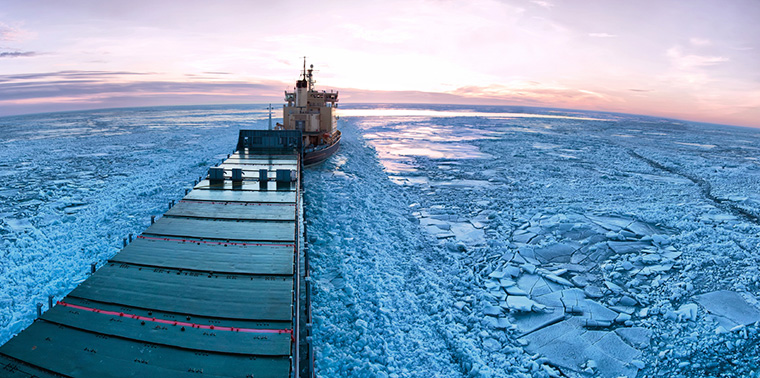May 25, 2016 —  Editor’s note: This piece was produced in collaboration with the academic journal Elementa. It is based on “Melting Ice, Growing Trade?”, published May 20 at Elementa.
Editor’s note: This piece was produced in collaboration with the academic journal Elementa. It is based on “Melting Ice, Growing Trade?”, published May 20 at Elementa.
Visions of safe passage for cargo ships across the Arctic between Europe and Asia have sprung up in recent years as ice-free zones have appeared along the northern coasts of Russia and Canada. Some shipping companies already have begun taking advantage of the change. But dreamers and schemers may want to think twice about the long-term promise of the so-called Northern Sea Route for boosting trade, caution scientists from the U.K., U.S. and Germany in a study published earlier this month in the journal Elementa.
The study, led by Sami Bensassi of the University of Birmingham, brought climate modeling experts and economists together to explore how both sea ice conditions and the economics of shipping are likely to change between 2050 and 2100 as the the planet warms. Researchers began by plotting a likely trade route, then using projections from 33 climate models and two emissions scenarios to predict how long a likely trade route would be open for shipping each year. Finally, they looked at the resulting picture through an economic lens to determine how changes in environmental conditions would likely translate into actual changes in international maritime trade between Europe and Asia.
They found that in the second half of this century, climate change is unlikely to dramatically shift cargo ships from their current route through the Suez Canal even if variables such as transit fees, insurance and availability of ports are put aside to focus on uncertainties regarding ice-free dates and distance reduction. Even under the most “aggressive” emissions model and six months’ possible navigation toward the end of the century, the economic models predicted that the NSR would likely boost trade by 7 percent at best between Europe and Asia by the end of the century — the equivalent of an annual growth rate of 0.072 percent.
“These results suggest that use of the NSR is unlikely to significantly alter international trade patterns, and will not be a leading economic force in transforming the Arctic,” the researchers concluded. ![]()
Ensia shares solutions-focused stories free of charge through our online magazine and partner media. That means audiences around the world have ready access to stories that can — and do — help them shape a better future. If you value our work, please show your support today.
Yes, I'll support Ensia!
